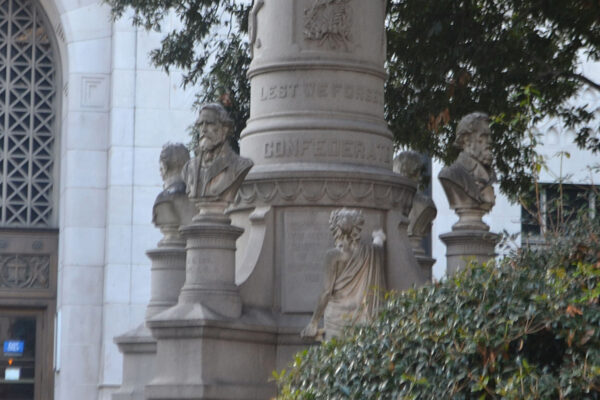Last month a federal judge refused to block the removal of a Confederate monument that was erected on courthouse grounds in Shreveport more than a century ago. The monument, dedicated in 1906, was built to commemorate the “Lost Cause” of the Confederacy and the “principles for which the Confederate soldier fought and died.”
We don’t have to speculate about what those “principles” were, because Louisiana’s leaders spelled them out when they seceded from the Union: “[T]he people of the slaveholding states are bound together by the same necessity and determination to preserve African slavery.”
Since their construction decades after the end of the Civil War, this monument and others like it were part of a concerted effort to recast the Confederacy as an honorable and patriotic cause. And it worked: a survey by the Southern Poverty Law Center in 2017 found that only 8 percent of high school seniors could identify slavery as the central cause of the Civil War.
Removing these monuments from our public spaces is one step towards correcting the record and confronting the Confederacy for what it was: a cause dedicated to protecting the institution of slavery and perpetuating the ideology of white supremacy.
Correcting the record also means honoring the memory of some of the forgotten heroes who have not received the recognition they deserve.
One hundred and forty-nine years ago this week (Feb. 27), John Willis Menard of Louisiana became the first African-American to address the U.S. House of Representatives. The previous November, Menard had become the first Black man ever elected to the House, winning his election with 64 percent of the vote. But Congress refused to seat him.
The nation’s first black Lieutenant Governor, Oscar James Dunn, was a champion of universal suffrage. After Dunn’s mysterious and untimely death, $10,000 was dedicated to create a monument in his honor, but it was never built. And Pinkney Pinchback became the first African-American to serve as governor of a U.S. state, but was denied his seat in the U.S. Senate.
During the Civil Rights Movement, freedom fighters like Oretha Castle Haley stood up to defy Jim Crow and demand racial justice. And leading NAACP attorney A.P. Tureaud filed a series of lawsuits that led to the desegregation of Louisiana State University and the Orleans Parish School District.
These are the unsung heroes we should be honoring – not only during Black History Month, but every day of the year.
Above all, the most important way to commemorate Black history in Louisiana is to continue the fight for racial justice and equality – in the courts, in the State Capitol, and in our communities. From voting restrictions and debtors’ prisons, to a legal system that allows people to be convicted by a less-than-unanimous jury, Black and brown people in Louisiana are still living under rules created by white supremacists to subjugate and oppress them.
Like Confederate monuments, these injustices are not relics of the past. They are devastating realities that we must continue to dismantle brick-by-brick – to restore our our nation’s promise of freedom and justice for all.

